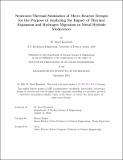Neutronic-Thermal Simulation of Micro Reactor Designs for the Purpose of Analyzing the Impact of Thermal Expansion and Hydrogen Migration in Metal Hydride Moderator
Author(s)
Kendrick, W. Reed
DownloadThesis PDF (13.67Mb)
Advisor
Forget, Benoit
Terms of use
Metadata
Show full item recordAbstract
The recent increased interest in microreactor designs has presented the opportunity to take advantage of the smaller core dimensions to perform steady state neutronic-thermal coupled simulation with the inclusion of an additional physics system. This work accomplishes this, by adding thermal expansion and zirconium hydride-based hydrogen diffusion to the neutronic-thermal simulation of multiple heat pipe microreactor designs. Microreactors’ smaller cores are inherently characterized by more leakage than gigawatt-scale reactor cores. The inclusion of thermal expansion’s representation in the coupling system may reveal neutronic or thermal impacts of geometric expansion that have yet to be noted for these smaller scale geometries. This is the impetus for the work on thermal expansion. The work on hydrogen diffusion is inspired by the common use of zirconium hydride in microreactor designs as a moderator. This material provides high density of hydrogen with high melting point, but features a well documented increase in mobility of hydrogen within the zirconium lattice at high temperatures. Coupling this migration of hydrogen within the neutronic-thermal simulation is performed in order to identify and analyze neutronic and thermal impacts due to the movement of hydrogen within the moderator. Additionally, a heat pipe failure case is simulated for each microreactor geometry studied, aimed to analyze the impacts of multipipe failure on both thermal expansion and hydrogen diffusion, as well as their downstream neutronic-thermal effects.
Date issued
2024-09Department
Massachusetts Institute of Technology. Department of Nuclear Science and EngineeringPublisher
Massachusetts Institute of Technology